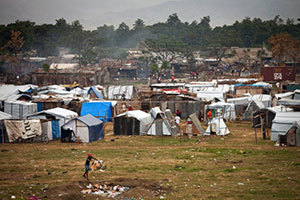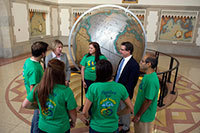 Haiti
Haiti
Catholic Relief Services (CRS) in Haiti has asked the University of Notre Dame Initiative for Global Development (NDIGD) to assist in conducting the Year 2 final evaluation for its cholera prevention and treatment program in Haiti. NDIGD will partner with Notre Dame’s Eck Institute for Global Health to conduct the final evaluation of the program that will draw on the initial evaluation that was conducted by NDIGD Monitoring and Evaluation Specialist Juan Carlos Guzman.
CRS is operating a Centers for Disease Control and Prevention-funded program in Haiti in an effort to halt the spread of cholera. Cholera is an infectious and often fatal bacterial disease of the small intestine. Typically contracted from contaminated water supplies, it can cause severe vomiting and diarrhea that can lead to dehydration, and tends to be most deadly for children and elderly people. The Haitian epidemic has affected more than 639,000 people and claimed more than 7,900 lives. Cholera can be halted with improved hygiene, sanitation and drinking water.
Prior evaluations of the CRS post-earthquake cholera education programming in Haiti were conducted in June 2011 and May 2012 to evaluate the efficacy of its social marketing efforts for cholera prevention. CRS conducted a Knowledge, Attitude and Practice (KAP) survey to the areas where the program was implemented in Haiti. The KAP survey provided information about the knowledge of the community about how to prevent and treat cholera, and the hygiene practices that reduce the spread of the disease.
 Master of Science in Global Health students
Master of Science in Global Health students
Guzman works with students from Notre Dame’s Master of Science in Global Health program, administered by the Eck Institute. This academic program has provided students the opportunity to help conduct the initial baseline and midline evaluations in Haiti.
In 2013, Guzman will again assist CRS to understand how its efforts are impacting the people of Haiti. The Year 2 final evaluation will draw on the experience of the CRS team and the Year 1 evaluation.
Guzman will be the project lead for the Year 2 evaluation and will again work with Master of Science in Global Health students to help determine whether field workers are effective in reaching the people.
“NDIGD offers monitoring and evaluation expertise to determine the impact of global development projects,” says Robert Bernhard, vice president for research at Notre Dame. “They specialize in working with development practitioners such as Catholic Relief Services to measure and evaluate the effectiveness that programs have on communities in developing countries.”
“The Year 2 final evaluation will assist CRS in knowing whether their prevention program and education campaign was successful,” Guzman says. “We have worked with students to support the analysis of the data obtained from community members to ascertain how much they now know about cholera, and the ways cholera can be prevented and treated."
The Year 2 survey will be conducted in spring 2013.
Contact: Michael Sweikar, managing director, NDIGD, msweikar@nd.edu